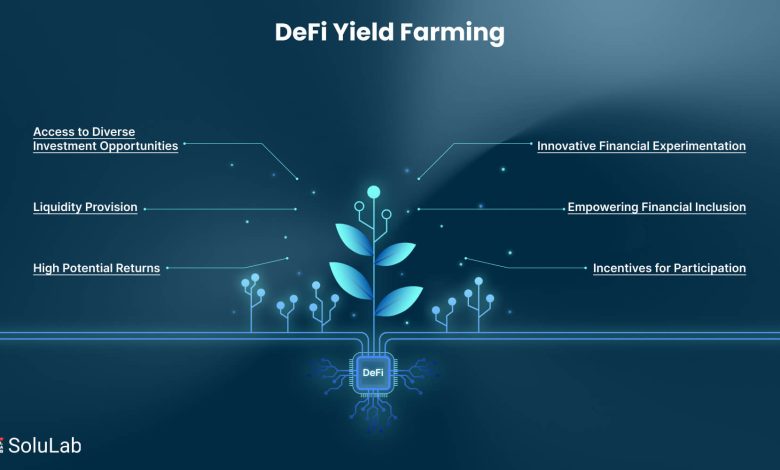The Risks and Rewards of Staking in DeFi

- Understanding the Basics of Staking in DeFi
- Exploring the Potential Returns of Staking in DeFi
- Mitigating Risks: Security Concerns in DeFi Staking
- Comparing Staking Platforms: Which One is Right for You?
- The Future of Staking: Trends and Innovations in DeFi
- Tips for Successful Staking in the Volatile DeFi Market
Understanding the Basics of Staking in DeFi
Staking in decentralized finance (DeFi) is a process where users lock up their cryptocurrency to help secure the network and, in return, earn rewards. This practice plays a crucial role in maintaining the integrity and functionality of various DeFi platforms. By participating in staking, individuals contribute to the validation of transactions and the overall security of the network.
When users stake their assets, they essentially act as validators, helping to confirm transactions and create new blocks on the blockchain. In exchange for their contribution, stakers receive rewards in the form of additional cryptocurrency. The amount of rewards earned is typically proportional to the number of tokens staked, incentivizing users to actively participate in the network.
Staking can be a lucrative way for individuals to earn passive income on their cryptocurrency holdings. However, it is essential to understand the risks involved. While staking offers the potential for high returns, there is also the possibility of losing some or all of the staked assets. Factors such as network security, market volatility, and smart contract vulnerabilities can all impact the safety and profitability of staking.
Exploring the Potential Returns of Staking in DeFi
When it comes to exploring the potential returns of staking in DeFi, it is essential to understand the various factors that can impact your investment. Staking involves locking up your cryptocurrency to support the network and, in return, earning rewards. These rewards can vary depending on the platform you choose to stake with, the duration of your stake, and the overall performance of the network.
One of the key benefits of staking in DeFi is the potential for passive income. By staking your cryptocurrency, you can earn rewards without actively trading or investing in the market. This can be especially appealing to long-term investors looking to grow their holdings over time.
However, it is important to note that staking in DeFi also comes with risks. The value of your staked cryptocurrency can fluctuate, and there is always the possibility of losing some or all of your investment. Additionally, the DeFi space is still relatively new and can be subject to regulatory changes and security vulnerabilities.
Overall, staking in DeFi can be a lucrative investment strategy for those willing to take on some risk. By carefully researching and selecting reputable platforms, diversifying your investments, and staying informed about market trends, you can maximize your potential returns while minimizing your exposure to risk.
Mitigating Risks: Security Concerns in DeFi Staking
When it comes to staking in DeFi, there are certain security concerns that need to be addressed to mitigate risks. While DeFi staking can offer attractive rewards, it is important to be aware of the potential threats that come with it.
One of the main security concerns in DeFi staking is the risk of smart contract vulnerabilities. Since DeFi platforms rely heavily on smart contracts to facilitate staking activities, any flaws in the code can be exploited by malicious actors to steal funds.
Another security risk to consider is the potential for hacks and cyber attacks on DeFi platforms. Staking pools and liquidity pools are often targeted by hackers looking to exploit vulnerabilities and steal assets from unsuspecting users.
To protect yourself from these security threats, it is important to do your due diligence before staking your assets on a DeFi platform. This includes researching the platform’s security measures, audits, and reputation in the crypto community.
Additionally, consider diversifying your staking portfolio across multiple platforms to spread out the risk and minimize the impact of any potential security breaches. By taking these precautionary measures, you can enjoy the rewards of DeFi staking while protecting your assets from security threats.
Comparing Staking Platforms: Which One is Right for You?
When it comes to **staking** in **DeFi**, there are several **platforms** to choose from. Each **platform** has its own **features** and **benefits**, so it’s important to **compare** them to find the one that is right for you. Here are some **factors** to consider when **comparing** **staking platforms**:
1. **APY**: **Annual Percentage Yield** (**APY**) is an important **metric** to consider when **choosing** a **staking platform**. **Higher** **APY** means **higher** **rewards** for **staking** your **tokens**.
2. **Lock-up Period**: Some **staking platforms** require you to **lock** your **tokens** for a certain **period** of time. Make sure to **check** the **lock-up period** before **staking** to avoid any **surprises**.
3. **Security**: **Security** is **crucial** when it comes to **staking**. **Choose** a **platform** that has a **proven** track record of **security** to **protect** your **assets**.
4. **User Interface**: **User interface** (**UI**) is also an important **factor** to consider. **Choose** a **platform** that is **easy** to **use** and **navigate** for a **smooth** **staking** experience.
5. **Community**: **Joining** a **staking platform** with a **strong** **community** can provide **support** and **guidance** as you **navigate** the **world** of **DeFi** **staking**.
By **considering** these **factors** and **comparing** **staking platforms**, you can find the one that is right for you and **start** **staking** your **tokens** to **earn** **rewards** in the **world** of **DeFi**.
The Future of Staking: Trends and Innovations in DeFi
Looking ahead, the future of staking in DeFi appears to be filled with exciting trends and innovations that are set to revolutionize the industry. These advancements are poised to enhance the efficiency and security of staking protocols, making them more attractive to investors and users alike.
One of the key trends in the future of staking is the rise of cross-chain staking, which allows users to stake their assets across multiple blockchains. This not only diversifies their staking portfolio but also reduces the risk of being locked into a single network. Additionally, advancements in interoperability solutions are making it easier for users to move their assets seamlessly between different blockchains, further enhancing the flexibility of staking.
Another important innovation in the future of staking is the development of decentralized staking pools, which enable users to pool their assets together to increase their chances of earning rewards. These pools are governed by smart contracts, ensuring transparency and security for all participants. By participating in decentralized staking pools, users can benefit from economies of scale and maximize their staking rewards.
Tips for Successful Staking in the Volatile DeFi Market
When it comes to staking in the volatile DeFi market, there are several tips that can help you navigate the risks and maximize your rewards. Here are some key strategies to keep in mind:
- **Diversify** your staking portfolio to spread out the risk and avoid putting all your eggs in one basket.
- **Stay Informed** about the latest trends and developments in the DeFi space to make informed decisions about where to stake your assets.
- **Set Realistic Expectations** for your staking rewards and be prepared for fluctuations in the market that can impact your earnings.
- **Monitor Your Investments** regularly to ensure that you are making the most of your staking opportunities and adjusting your strategy as needed.
- **Consider Staking Pools** as a way to pool your resources with other investors and increase your chances of earning rewards.
By following these tips, you can increase your chances of success in the DeFi market and make the most of the opportunities available for staking your assets.




